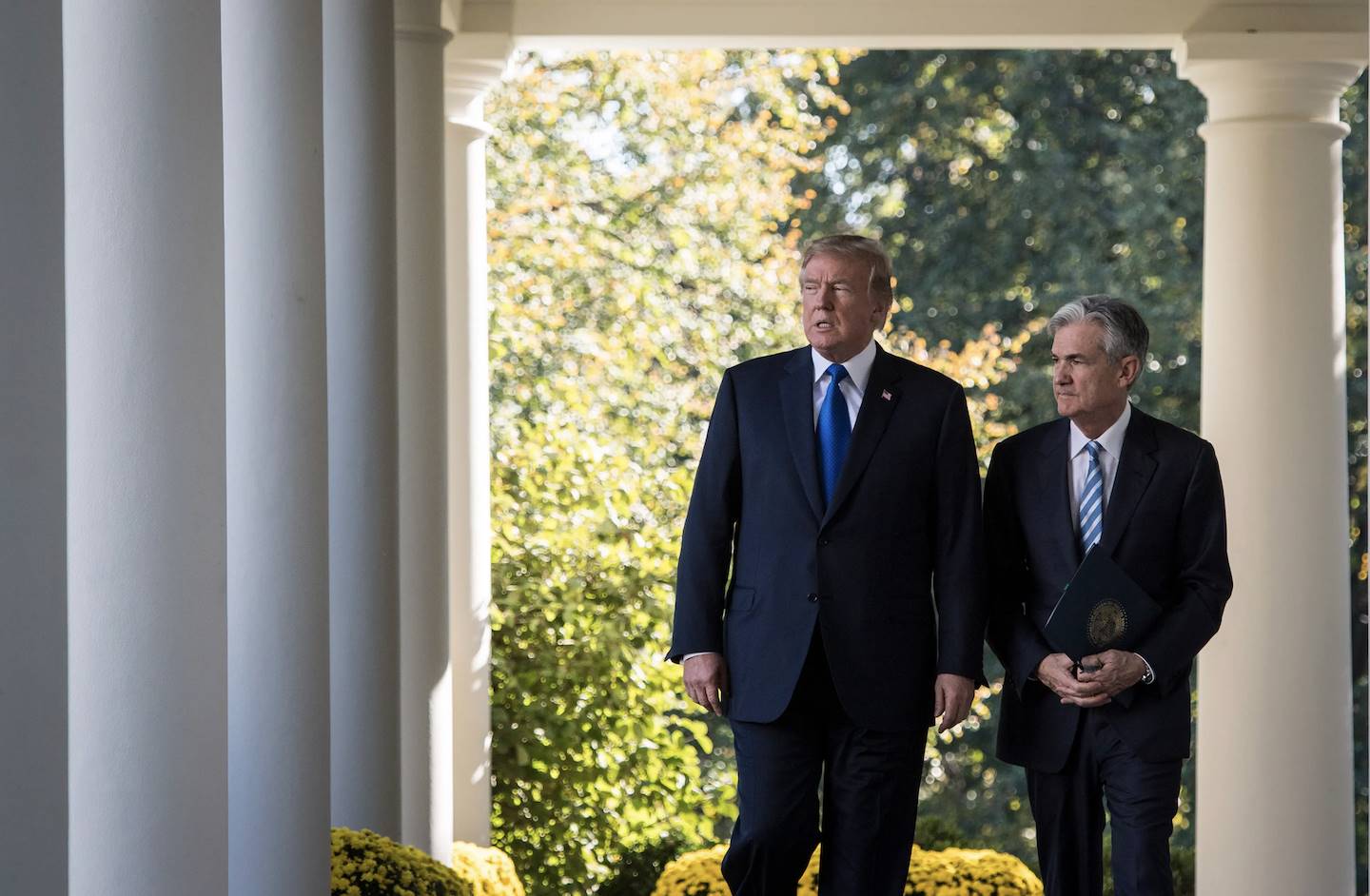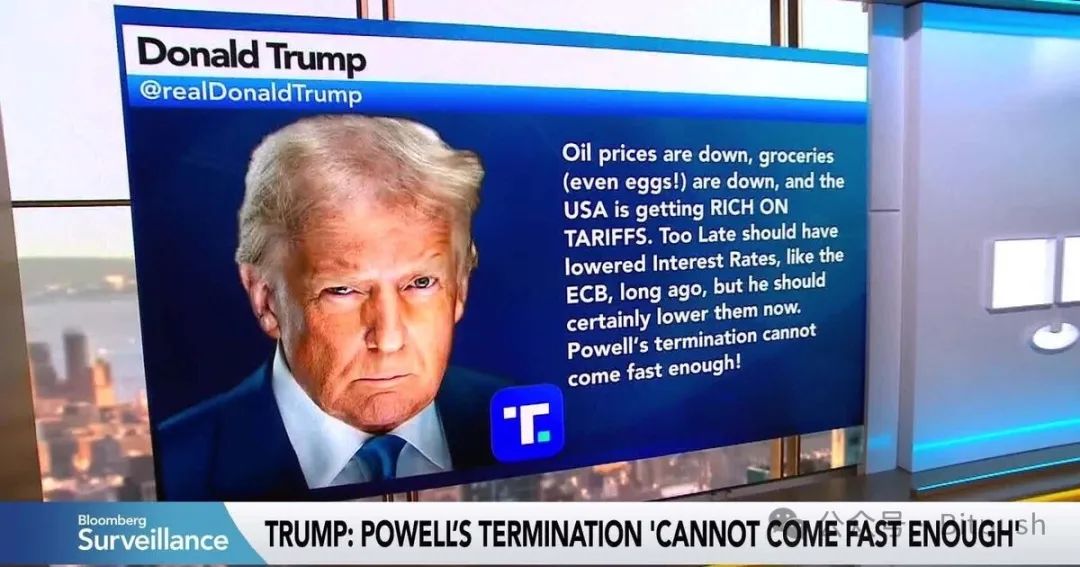Written by: Nik Popli
Compiled and Edited by: Bit BitpushNews

The Federal Reserve has long prided itself on its independence. However, as U.S. President Donald Trump intensifies his attacks on Federal Reserve Chairman Jerome Powell due to his refusal to cut rates, this tradition of "independence" is facing new pressure.
On Thursday local time, Trump told reporters in the Oval Office: "If I want him gone, believe me, he'll be gone soon."
On his social media platform Truth Social, Trump reiterated: "Get Powell out, and do it as quickly as possible!"

Image source: Bloomberg
These remarks are one of Trump's sharpest actions to date, aimed at undermining the political independence of the Federal Reserve—a key institution traditionally independent from the White House and responsible for maintaining economic stability.
The day before, during a speech at the Chicago Economic Club, Powell rebutted political interference, stating that the Federal Reserve would make decisions solely based on what is most beneficial to the American people.
Powell said in his speech: "This is the only thing we will do... We will never be influenced by any political pressure... Our independence is a legal matter."
Powell added that Federal Reserve board members "cannot be removed without cause" and that "our terms are long, seemingly endless."
Nevertheless, this has not stopped Trump from attempting to fire the Fed chairman. "I think he's not doing a good job," the president stated on Thursday, claiming Powell's rate cuts were "too late".
Powell was initially nominated by Trump to lead the Federal Reserve in 2017 and was renominated by Joe Biden in 2022. His current chairmanship will continue until May 2026.
While previous presidents have expressed dissatisfaction with the Fed's rate decisions conflicting with their policy goals, Trump's remarks have raised new concerns about political interference in monetary policy, a development that could spook markets and damage the central bank's credibility.
Trump's aggressiveness has even worried some of Powell's critics, including veteran Democratic Senator Elizabeth Warren, who earlier warned that undermining the Fed's independence could bring disaster to U.S. markets.
Sarah Binder, a senior researcher at the Brookings Institution and Federal Reserve expert, said: "The Federal Reserve needs public confidence." "But if the president tries to push Powell out, it will only add uncertainty that markets would not like to see."
Here is the information about the limitations of the U.S. president's power over the Federal Reserve and what this means for the economy.
Can Trump Fire Powell?
Legally, the answer is complex and untested. No Federal Reserve Chairman has ever been fired by a president.
The Federal Reserve Act allows board members, including the chairman, to be dismissed "for cause". However, this has historically been interpreted as misconduct or incapacity, not policy disagreements. Sarah Binder says: "Courts typically do not view differences in rate setting as 'misconduct'."
Although Trump and his allies have suggested the possibility of firing Powell since his first term, they have not done so, likely due to unclear legal prospects and potential negative effects.
Powell himself has explicitly stated he will not voluntarily resign. When asked last November if he would resign if Trump requested it, he simply answered: "No."
Nevertheless, the Trump administration seems to be preparing for a potential confrontation. Treasury Secretary Scott Bessent recently told Bloomberg that he expects to start interviewing potential replacements for Powell in the fall.
As Trump pushes to remove Powell, the U.S. Supreme Court is currently hearing a case involving the president's power to fire senior officials of independent agencies.
While the case involves the National Labor Relations Board and Merit Systems Protection Board, its impact could be broader. If the court supports the Trump administration, it could be interpreted as a signal of how it might resolve the legal conflict surrounding Trump's desire to remove Powell, although the Federal Reserve says it does not believe the challenge applies to it.
At the core of this debate is a nearly century-old legal precedent: the 1935 Supreme Court decision in Humphrey's Executor v. United States, which limited the president's power to remove leaders of independent agencies without cause. This ruling has long protected the Fed chairman from political dismissal but may soon be tested by the conservative Supreme Court.
Economic Stakes
Trump accuses Powell of failing to take sufficiently aggressive action to support economic growth, claiming the Fed chairman is "playing politics" by maintaining rates.
However, U.S. central bank officials—and many economists—hold the opposite view: an independent Federal Reserve is crucial for managing inflation and guiding the economy, and yielding to political demands could damage the economy and global trust in U.S. institutions.
Powell insists that the Federal Reserve's decisions are "entirely based on factors most beneficial to all Americans".
In his Wednesday speech, he warned that Trump's broad tariffs could push the U.S. economy into a "challenging situation" of rising inflation and slowing growth—a scenario that complicates the Fed's dual mission of stabilizing prices and maximizing employment. Trump's tariffs have increased the cost of many imported goods, squeezed household budgets, and raised concerns about policy-induced economic slowdown while inflation remains above the Fed's 2% target.
Meanwhile, Trump demands immediate rate cuts, pointing out that the European Central Bank cut rates on Thursday.
Yale University's Budget Lab estimates that the inflationary effect of Trump's tariffs is equivalent to an additional $4,900 in real tax burden for each U.S. household. Simultaneously, long-term rates have soared, making borrowing costs higher for homebuyers, businesses, and consumers.
Jerome Powell's Experience
Currently 71 years old, Powell is serving his second term as chairman of the U.S.'s most powerful economic decision-making body—the Federal Reserve. As a Republican and former investment banker, he was initially appointed to the Federal Reserve Board by Obama in 2012 and elevated to chairman by Trump in 2017. Biden later reappointed him, indicating broad bipartisan trust in his ability to lead the central bank.
During Powell's tenure, the Federal Reserve has addressed a series of economic shocks, from the pandemic-induced recession to the worst inflation in forty years. Under his leadership, the central bank lowered rates near zero in 2020 to stabilize the economy during COVID-19, then began raising rates in 2022 to curb inflation that had soared above 9%.
Although inflation cooled in March to a six-month low, the process was bumpy, and Powell has been criticized by both sides for whether the Fed's actions were too slow or too aggressive.
Binder says: "Support for Powell may have significantly decreased compared to his first term when the economy was performing very well. Many might say the Fed was too late in curbing inflation in 22-23 and made major policy mistakes. So now the question is, who will stand up to support the Federal Reserve in this situation?"








